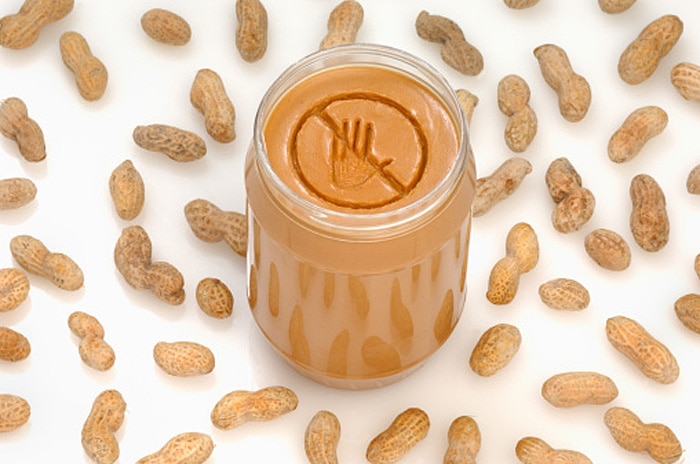
Written By: Beth Ehrensberger, RD
Title: Registered Dietitian
Alumni: University of Tennessee, Knoxville
Last Updated on:

Research from Duke University (March 2009) shows a lot of promise for the future of managing peanut allergies, but until that translates into a cure or treatment, if you or someone close to you is allergic, the emphasis is on safety and avoidance. But when peanuts or peanut butter seem to crop up on just about every menu, from deli shops to white tablecloth restaurants, it’s a tricky task. Plus, when it comes to nutrition, there are a lot of health benefits packed into that little nut, so it really pays to find a few handy stand-ins. Read on for some ideas on how to safely manage a peanut allergy – nutritiously!

Table of Contents
With a peanut allergy, obviously, basics like peanuts of any type and peanut butter are out – but that’s just the beginning. Peanuts can hide in baked goods, candy (especially chocolate), specialty pizzas, sauces, and marinades, as well as some ethnic cuisines (such as Asian or Mexican). Also, foods that claim to contain extruded, cold-pressed, or expelled peanut oil may contain peanut protein, and are not safe. It’s also important to thoroughly read the entire ingredient label to watch for statements like “may contain traces of peanuts” or “made in a facility that processes peanuts or on the same equipment that processes peanuts.” While many foods don’t contain peanuts, they may come into contact with the residue, which can be just as dangerous.
If you are able to eat tree nuts or soy (if you are unsure, check with your allergist first), alternative spreads like almond or soy nut butters are a great solution, since they can provide a strikingly similar nutrient profile to peanut butter, as well as taste and convenience. Brands like Blue Diamond or Barney Butter (both almond butters made in almond-only facilities) are great spreads to try. These products can stand in for peanut butter when a recipe calls for it – just substitute an equal amount. Think almond butter and banana muffins or almond butter smoothies. Who knows? You may just find that you’ll never wish for peanuts again. Almond butter, for example, tastes fantastic and gives you a better nutritional bang with less saturated fat but more heart-healthy monounsaturated fat, Vitamin E, calcium, and magnesium than peanut butter. Don’t despair if you’re not able to eat tree nuts; some specific products, like SunButter (sunflower seed butter) provide a healthy, versatile alternative to peanut and tree nut butters – and like almond butter, contains less saturated fat and more monounsaturated fat than peanut butter.
If you’re wishing for the crunch of peanuts to toss into baked goods, top yogurt, or stash for a snack, Blue Diamond brand almonds can be just the solution if you are able to eat tree nuts, since they are processed in a dedicated almond-only facility. Even better, if you are looking to bring your cholesterol down, the good news is that May 2010 research from Loma Linda University found that there are plenty of other nuts besides peanuts that offer heart-healthy benefits – walnuts, almonds, pecans, hazelnuts, macadamias, and pistachios work just as well!
If you have a peanut allergy, that doesn’t mean you have to miss out on the health benefits and convenience of one of the most popular and widespread foods. There are plenty of worthy substitutions to keep your peanut-free diet full of flavor and nutrition! When you’re buying, just be sure the brands you choose – whether they’re tree nuts, or alternative nut or seed butters – are processed in a peanut-free facility.
Alumni: University of Tennessee, Knoxville – Beth Sumrell Ehrensberger is a Registered Dietitian and holds a Master Degree in Public Health. An experienced nutrition counselor, writer and public speaker, Beth specializes in translating complex nutrition information into practical concepts. Beth was awarded a Nutrition Communications Fellowship to the National Cancer Institute, and has worked on the internationally recognized Nutrition Action Healthletter of the Center for Science in the Public Interest.
allergy, kid's nutrition, nuts, seeds